What are the benefits of rice water, how to prepare it correctly and for what purposes to use it
Aqueous extracts from rice have a number of beneficial properties and are used as folk remedies for digestive disorders. Unlike medications, they do not cause side effects, are easy to prepare and do not require special financial costs.
Let's take a closer look at what properties these rice-based folk remedies have, how to prepare and use them.
Composition and properties of rice water
Unlike porridge, water extracts from rice do not contain dietary fiber, and the amount of fat in them is minimal. The table shows the nutritional value of rice water and porridge for comparison.
| Nutritional indicator | Amount per 100 g of decoction | Amount per 100 g of porridge |
|---|---|---|
| Calorie content | 37 kcal | 144 kcal |
| Squirrels | 0.7 g | 2.4 g |
| Fats | 0.1 g | 3.5 g |
| Carbohydrates | 8.5 g | 25.8 g |
| Alimentary fiber | 0 g | 1 g |
In addition to nutrients, rice drinks contain (per 100 g of product):
- vitamins:
- E - 0.03 mg;
- B1 - 0.016 mg;
- B2 - 0.008 mg;
- RR - 0.8 mg.
- microelements:
- potassium - 28 mg;
- calcium - 8 mg;
- magnesium - 14 mg;
- phosphorus - 41 mg;
- iron - 0.32 mg;
- sulfur - 11 mg;
- zinc - 0.03 mg;
- iodine - 0.034 mcg;
- copper - 6 mcg.
Rice decoctions and tinctures contain gluten, which has a fixing effect.
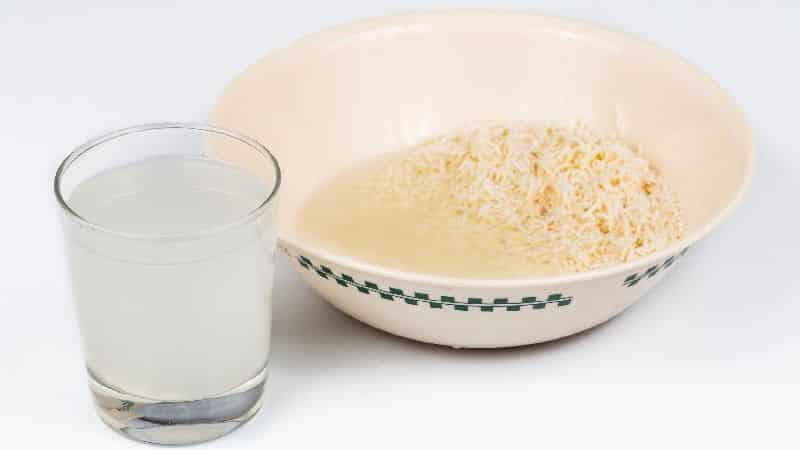 Rice water and tincture are easily digestible products, sources of soluble carbohydrates and vegetable protein.These agents have antitoxic, regenerative and enveloping properties, and also reduce the acidity of gastric juice, therefore they are used for digestive disorders.
Rice water and tincture are easily digestible products, sources of soluble carbohydrates and vegetable protein.These agents have antitoxic, regenerative and enveloping properties, and also reduce the acidity of gastric juice, therefore they are used for digestive disorders.
Important! People suffering from constipation should not eat foods containing gluten to avoid worsening bowel problems. It is also contraindicated for celiac disease - gluten intolerance.
Since aqueous extracts from rice contain little number of calories, these products are used for weight loss.
Benefits of rice water
Rice decoction is used not only internally as a food product, but also externally as a cosmetic.
Externally, rice water extracts are used for washing, rinsing hair, and also as components of masks.
When using rice decoction, the following cosmetic effects are achieved:
- inflammation on the skin decreases;
- pores become smaller, acne is alleviated, and the skin is cleansed;
- when rinsing hair after shampooing, it softens the hair and nourishes the hair follicles;
- Vitamin E contained in the decoction promotes skin cell renewal and enhances regeneration processes.
A decoction of rice grains is included in the list of dietary food products. It is prescribed for digestive and metabolic disorders.
When taken orally, rice water:
- Strengthens stool and is used for diarrhea if the cause of intestinal upset is not infectious.
- Adsorbs toxins in the intestines, therefore it is used in case of poisoning as an additional remedy together with adsorbent preparations.
- Reduces acidity in the stomach, relieves the symptoms of gastritis with high acidity, helps with heartburn.
- Serves as a source of easily digestible nutrients, restores the body after illnesses.
- Being low in calories, it helps in weight loss.
This product will be a worthy replacement for chicken broth for people who prefer vegetarian cuisine, as it accelerates the recovery of the body after exhaustion, poisoning and colds.
Rice tincture relieves joint pain, reduces inflammation, and activates connective tissue regeneration processes.
Methods for preparing rice extracts
Uncooked rice is used to prepare aqueous extracts. Suitable for poisoning round grain varieties.
Long grain And brown rice is used for other digestive disorders and for cosmetic purposes.
Congee
Rice water is popular for digestive problems.
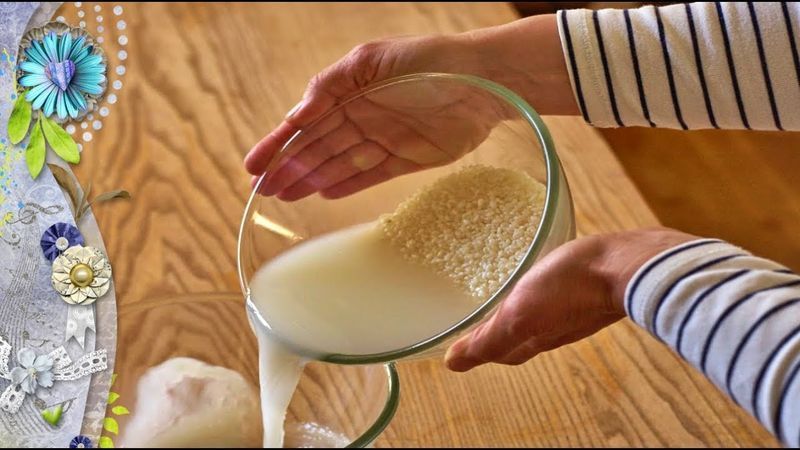
Preparation of the decoction:
- Rice is washed several times in cold water until it becomes clear.
- Fill with drinking water in a ratio of 1:7.
- Heat over low heat until boiling.
- Cover the pan with a lid and cook for another 30 minutes.
- The rice is filtered through a sieve, the broth is poured into a storage container and cooled to room temperature.
Rice tincture
The process of preparing the tincture is more painstaking. It is used for arthritis and other inflammatory diseases of the joints. Cooking steps:
- 4 tbsp are poured into a glass container. l. washed rice, 3 tbsp. l. sugar and 1 tbsp. l. unwashed seedless raisins.
- The ingredients are poured into 1 liter of cold water and covered with damp gauze folded in 2-4 layers.
- The resulting mixture is infused in a dark place for 4 days.
- The tincture is filtered through a sieve and poured into a storage container.
Drink this remedy 100 ml 3 times a day before meals for 2-3 months.
Rice water
In cosmetology, rice water is often used as a rejuvenating agent.
Cooking method:
- The washed rice is poured with clean water at room temperature in a ratio of 1:2.
- After 60-90 minutes, the infusion is mixed and filtered through a sieve.
To enhance the rejuvenating effect, rice water is fermented. To do this, store it in a dark place at room temperature in a closed container for 1-2 days.
Aqueous extracts from rice grains should be stored in the refrigerator for no more than three days.
Features and regimen of taking rice water for diarrhea, gastritis and poisoning
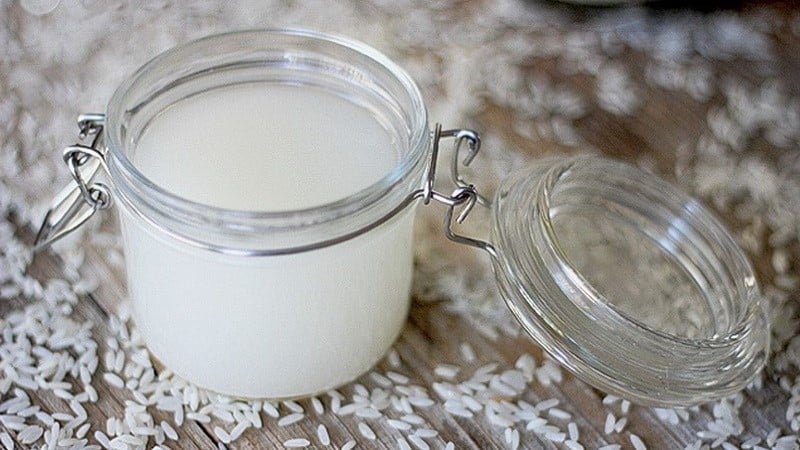
Depending on the type of digestive disorder, different regimens for taking this folk remedy are used.
For diarrhea, drink 50 ml (1/4 cup) of the decoction every 2 hours until symptoms disappear. In case of severe diarrhea, the use of the decoction is extended to 3 days.
If after this the symptoms do not disappear, use a decoction of fried rice. To prepare it, before cooking, the cereal is fried in a frying pan without oil until golden brown and ground into powder. The proportions and time of subsequent cooking are maintained.
For gastritis, use 1/3 cup of the decoction before meals or for discomfort and burning in the stomach.
In case of poisoning, a decoction of rice grains is used in a dose of 50-70 ml every 2-4 hours during the day. At the same time, drink at least 300-500 ml per day.
For such diseases in children, the portions of the decoction are reduced by 2-3 times.
Attention! If diarrhea is accompanied by a fever, seek medical attention. Fever with diarrhea is a sign of an infectious disease.
Using rice water for cosmetic purposes
For external use, the decoction is diluted with clean water in a 1:1 ratio. The resulting solution is used instead of micellar water to cleanse the skin of the face.Wipe a cleansed face morning and evening with a cotton swab dipped in the broth, using it as a means to moisturize and nourish the skin.
For eczema, dermatitis, acne, sunburn and other skin lesions, apply a cotton swab dipped in the broth to the inflamed areas for 5-10 minutes. The procedure is repeated several times.
A strong decoction is added to baths as a nourishing, softening and rejuvenating agent. Such baths are used no more than 2 times a week.
To nourish and soften the hair, after washing, rinse with rice water, which is washed off with clean water 5-15 minutes after application.
Shampoo for dry, brittle and frizzy hair is prepared from rice flour and rice water. Flour is poured with rice water to the consistency of gruel and left for 10 minutes to infuse. The resulting product is used instead of shampoo or diluted with regular soap shampoo in a 1:1 ratio.
Features of the use of rice water
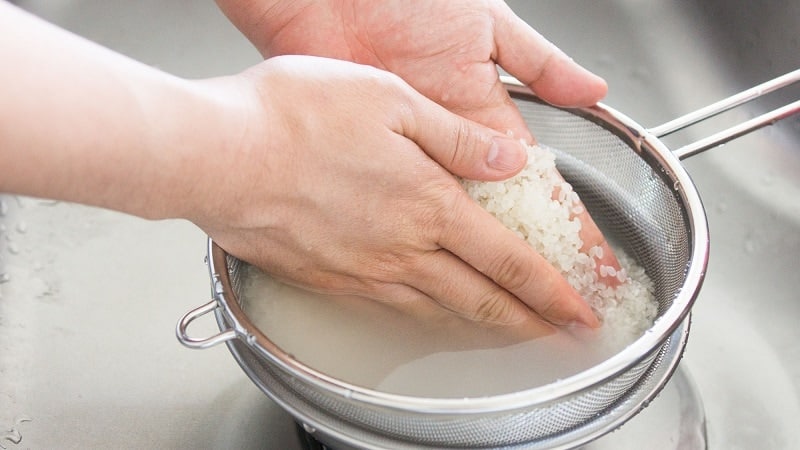
The child's body has its own physiological characteristics. This is taken into account when using medications and traditional medicine. Physiological processes in the body of an expectant or nursing mother also change.
Features of reception for children
Children's intestines are more sensitive, so the decoction recipe differs from the recipe used for adults.
Before cooking 4 tbsp. l. rice (for infants - 2 tablespoons of rice) soak for an hour in 1 liter of cold, clean water.
To treat diarrhea, use a fresh decoction without salt and sugar. Children are given 50 ml of decoction 3-4 times a day until discomfort disappears and stool normalizes.
In case of poisoning, add a small amount of salt. Give 25-30 ml every 2-4 hours during the day.
The decoction used as a component of baby food is diluted with water or milk.
Features of use during pregnancy and lactation
Rice water helps get rid of symptoms of toxicosis, swelling and fatigue. With regular use of this product, the condition of the skin, hair, nails and teeth improves.
When breastfeeding, the use of rice extracts stimulates lactation. After childbirth, the decoction will help stabilize weight, and baths with fermented water are used to tighten the skin.
To ensure that regular use of the decoction does not cause constipation, add a little salt when preparing it. For toxicosis and swelling, use a fresh drink. If digestive problems occur, stop taking rice extracts.
The decoction is consumed as regular drinks, drinking up to 0.5 liters of liquid per day. If desired, vegetable juices, broths, fruit or vegetable purees are added to it to improve the taste.
Contraindications
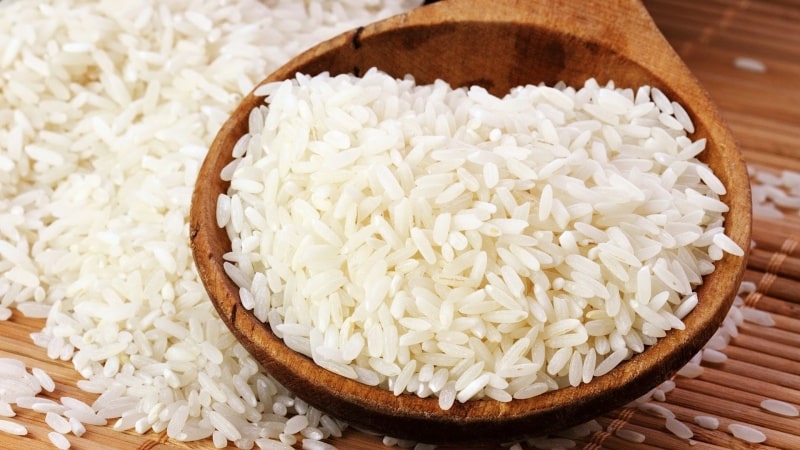
Contraindications for consuming aqueous extracts from rice include:
- Celiac disease. Gluten is otherwise called gluten. It should be excluded from the diet of patients with hereditary intolerance to cereal protein.
- Chronic constipation. The reason for the restriction is the same gluten, which has a fixing effect.
- Type 2 diabetes. The broth contains soluble carbohydrates, but there is practically no dietary fiber, so blood sugar levels can rise sharply. Type 2 diabetics should limit their intake of the decoction to 250 ml per day.
- Infectious bowel diseases. Water extracts from rice can enhance fermentation processes in the intestines, lead to bloating and worsen infectious processes.
- Gastritis with low acidity. Since rice broth reduces acidity in the stomach, the barrier function of the digestive tract decreases, which aggravates the course of the disease.
Conclusion
Rice water is used for diarrhea of non-infectious etiology, poisoning and gastritis with high acidity. It is useful for weight loss, has a beneficial effect on the body during pregnancy and enhances lactation during breastfeeding. Included in dietary and baby food.
Rice tincture is used for joint pain, arthritis and arthrosis. The decoction is used internally for digestive disorders, rice water is used externally to improve the condition of the skin, hair and nails.